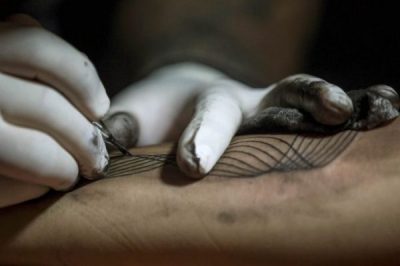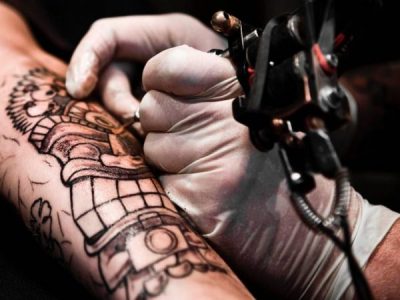
Tattoos (everything you need to know before getting a tattoo)
Contents:
Tattoos are a type of permanent body art that many people choose to apply to different parts of their body in order to present something special to them. To keep the tattoo on the skin, the skin is pierced with needles and ink, dyes and pigments are injected into the deep layer of the skin. In the past, tattoos were done by hand, meaning a tattoo artist pierced the skin with a needle and injected ink by hand, but today professional tattooists use tattoo machines that move the needles up and down as the ink moves. ... Today in this blog we want to tell you all the information you need if you want to get a tattoo on your skin. So keep enjoying this information and share it with your inquiries.

What is a tattoo?
A tattoo is a way to express feelings, thoughts, emotions, and more. Tattoos have been around for thousands of years and have evolved over time in technique and design. Tattoos are persistent marks on the skin made with ink and needles. Once the ink is applied to the second layer of skin known as the dermis, a wound is formed and the skin heals, revealing the pattern underneath the new layer. This practice is nowadays an acceptable form of body art that many people are very fond of.
Tattooing has long been a form of ceremonial rites and transitions in most cultures around the world. Tattoos are used to mark special occasions, pay tribute or reverence, and even join in hand-to-hand combat with ash traces that are then applied under the skin. To glorify life, choice, honor the memory of purpose and companions in life, tattoos have the ingenious ability to say a lot. Many people choose to remember their loved ones and honor life traditions and events with a tattoo. From symbols representing cultural imagery to words and fonts, tattoos can be very creative.
What do I need to know if I want to get a tattoo?
If you want to get a tattoo on your skin, there are a few things you need to know before doing so to avoid complications once you've done it.

Before getting a tattoo, you should know that the tattoo will accompany you for the rest of your life. Tattoos are permanent and if applied to the skin, they are very difficult to erase. For this reason, it is very important be sure one hundred percent that you want to get a tattoo on your skin. This is why it is so important to do your homework to prepare for the occasion. Remember, you are putting on your body a work of art that will be with you for a long time. It's worth a few minutes of serious thought.
The second thing to keep in mind is think carefully about the design What do you want to do with your skin? It is very important to have a design that you like and want to carry it with you at all times. A beautiful design can bring joy forever, but you better be extremely confident in the tattoo you are going to get. Try to find something special for you. It is also important to choose the location where you intend to get your tattoo and you can consult your professional tattoo artist for advice.
The third thing to keep in mind is look for a very good professional and that friends and family recommend it. A talented tattoo artist will listen to your description of what you want and then come up with a design before making an appointment. It's important to do enough research ahead of time to know that you enjoy this artist's performances. You should make sure that both the tattoo artist and the workshop you choose have considered your safety.
The fourth thing to remember is the place where you are going to get the tattoo... You must ensure that the tattoo studio is clean and safe and that all equipment used is disposable (in the case of needles, ink, gloves) and sterilized. These are procedures to be followed when handling blood and other body fluids to prevent the spread of HIV, hepatitis B, and other serious blood infections. If the studio looks messy, if something seems out of the ordinary, or if you feel uncomfortable, find a better place to get a tattoo.
It should also be borne in mind that depending on where you live, there may be certain age restrictions this may dictate the minimum age for tattooing. It is important to check with a professional tattoo shop about the local laws or jurisdictions that govern these tattoo requirements. In most cases, to get a tattoo, you must be 18 years old or have parental consent before applying your chosen design on your skin.
How is the procedure for applying a tattoo?
A tattoo is a permanent mark or pattern that is made on the skin using pigments that are injected through punctures into the top layer of the skin. Typically, the tattoo artist uses a hand-held machine that acts like a sewing machine, with one or more needles repeatedly piercing the skin and creating a pattern that has been chosen to be applied to the skin. With each injection, the needles are injected into the skin with small droplets of mascara and thus form the selected pattern. The tattooing process is performed without anesthetics and causes minor bleeding and mild or potentially significant pain, which will vary from person to person.
Does it hurt to get a tattoo?
In fact, the tattoo looks like someone is scratching your skin with a hot needle, because that is exactly what is happening. After about 15 minutes, your adrenaline will kick in and help deal with the pain a little, but if you do the most, the pain can come in waves. However, there are people who are more susceptible to pain than others and hardly feel any pain when getting tattoos. It's also important to say that depending on which area of your body you want to tattoo, it may hurt a little or a little less.
How to properly care for a tattoo?
If you have already decided to get a tattoo, it is important to know what kind of care you should take afterwards so that the tattoo can heal well and you have no problems.

Next steps:
It's important to make sure your tattoo artist covers your new tattoo with a thin layer of petroleum jelly and a bandage. The dressing should be removed after 24 hours.
Then you have to gently wash the tattoo with water and antimicrobial soap, and it is very important to make sure that you dry it very well and very gently. Once dry, apply a layer of antibacterial ointment or petroleum jelly twice a day. It is important not to apply a new bandage.
Before reapplying antibacterial ointment or petroleum jelly, gently wash the tattoo area twice a day with soap and water and pat dry.
As the tattoo heals, you should continue to apply moisturizer or ointment after cleaning to keep it moist. You must repeat this process for 2-4 weeks. You should also try not to wear clothing that sticks to your tattoo, and it is very important to avoid swimming and sunbathing for about 2 weeks after getting your tattoo.
Taking a cool shower is important, as boiling water will not only damage but can also discolor the ink.
It is advisable to use a sunscreen containing at least 7% zinc oxide sunscreen during daylight hours and / or cover it with clothing or a bandage. Don't worry if your tattoo has a little crust or hard layers. This is fine. But never pinch, scratch or scrape it, or you may get an infection or erase the color. If you think your tattoo is infected or is not healing properly, it is important to visit your trusted doctor and they will tell you what steps to take.
What are the risks of getting a tattoo?
Tattooing is very fashionable and many people choose to have different designs on their bodies. But it's important to know that skin infections and other complications are possible because tattoos penetrate the skin. Here are some of the risks associated with getting a tattoo in some cases.
Allergic reactionsSome of the ink used for tattoos, especially red, green, yellow and blue, can cause allergic skin reactions. These reactions can be an itchy rash at the tattoo site. This can happen even years after getting a tattoo.
Skin infections- Skin infection is possible after tattooing.
Other skin problems- Sometimes an area of inflammation called a granuloma can form around the tattoo ink. Tattoos can also lead to the formation of keloids, which are raised areas caused by overgrowth of scar tissue.
Bloodborne diseases- If the equipment used to create the tattoo is contaminated with infected blood, you can contract various bloodborne diseases such as methicillin-resistant Staphylococcus aureus (MRSA), hepatitis B and hepatitis C.
How are tattoos removed?
Sometimes because you can't stop thinking about what kind of tattoo to get on your skin, or simply because the tattoo you got was done when you were very young, and now you don't like it anymore, it becomes necessary erase the tattoo. There is good news and bad news when it comes to tattoo removal. The bad news is that tattoos need to be permanent and even the most advanced removal methods won't work for everyone, as your chances of success depend on your skin color, pigments, and tattoo size. The good news is that in recent years, the paint removal process has evolved from a potentially damaging process to a safer and more complex method using laser technology.
Multi-colored tattoos are more difficult to remove and may require different wavelength lasers to be effective. The best candidates for traditional laser removal are those with lighter skin. This is because laser treatments can change the color of darker skin. Older tattoos tend to fade more with laser treatment. New tattoos are more difficult to remove.
I hope you enjoyed all the information we give you here on this blog ...
Leave a Reply